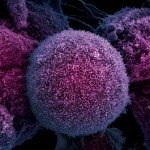Lien vers Pubmed [PMID] – 23567907
Mutat. Res. 2013 May-Jun;745-746:16-25
Ku80 forms a heterodimer with Ku70, called Ku, that repairs DNA double-strand breaks (DSBs) via the nonhomologous end joining (NHEJ) pathway. As a consequence of deleting NHEJ, Ku80-mutant cells are hypersensitive to agents that cause DNA DSBs like ionizing radiation. Here we show that Ku80 deletion also decreased resistance to ROS and alkylating agents that typically cause base lesions and single-strand breaks (SSBs). This is unusual since base excision repair (BER), not NHEJ, typically repairs these types of lesions. However, we show that deletion of another NHEJ protein, DNA ligase IV (Lig4), did not cause hypersensitivity to these agents. In addition, the ROS and alkylating agents did not induce γ-H2AX foci that are diagnostic of DSBs. Furthermore, deletion of Ku80, but not Lig4 or Ku70, reduced BER capacity. Ku80 deletion also impaired BER at the initial lesion recognition/strand scission step; thus, involvement of a DSB is unlikely. Therefore, our data suggests that Ku80 deletion impairs BER via a mechanism that does not repair DSBs.

